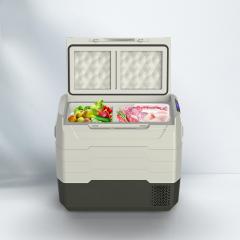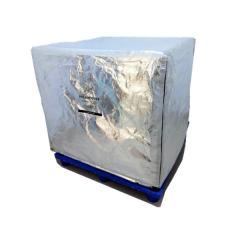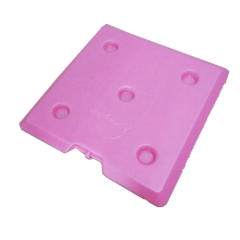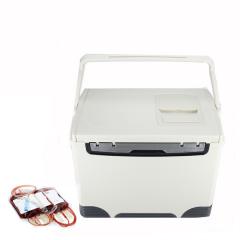At its core, healthcare cold chain logistics is a specialized branch of supply chain management that focuses on the transportation and storage of temperature-sensitive healthcare products.
This includes items such as:
- Vaccines
- Medications
- Medical devices
The ‘cold chain’ refers to the continuous series of refrigerated solutions that ensure these goods remain within the required temperature range. This means hospitals and other buyers of medical supplies will receive products that are in usable condition.
The Importance of Cold Supply Chain Management In the Healthcare Industry
There is a demand for medical supplies across the U.S. and throughout the world. Cold chain logistics solutions is essential for getting these valuable goods to the people that need them most.
Let’s discuss a few of the useful applications for refrigerated healthcare logistics services.
Protecting Sensitive Medical Supplies
Many medical supplies are biologically active and sensitive to temperature fluctuations. A break in the cold chain, even if brief, can result in reduced efficacy or even render the products hazardous for human use.
Sensitive medical items that healthcare supply chain management protects include:
- Vaccines
- Biopharmaceuticals
- Diagnostic kits
Each of these products are susceptible to spoilage if not kept in the right temperatures. Fortunately, cold supply chain management applies a few different methods to ensure these goods are handled correctly.
The techniques used include:
- Monitoring
- Specialized packaging
- Temp-controlled vehicles and equipment
Advanced healthcare cold chain monitoring systems track the conditions of the products in real-time and send alerts if any deviations occur. Thanks to this technology, goods are kept at the appropriate temperature during storage and transit.
Specialized packaging insulates medical items from warm environments. This is especially important whether products t need ultra-cold storage or have to be prevented from completely freezing. All healthcare items that travel through the cold supply chain are kept in some type of protective packaging.
Vehicles and trailers designed specifically for cold transportation ensure that temperature-sensitive products are always in optimal conditions. This allo
Meeting Regulatory and Safety Standards
In the U.S., numerous regulatory bodies have set strict standards for the transportation and storage of medical goods.
Two federal agencies in particular that dictate these rules include:
- U.S. Food and Drug Administration (FDA)
- Centers for Disease Control and Prevention (CDC)
Many of the regulations enforced by these agencies are used to prevent contamination. The FDA and CDC also outline transportation protocols and require certain temperature monitoring procedures.
Beyond federal oversight, individual states may have their own set of regulations for transporting medical supplies. These can vary and may add additional layers of requirements for companies operating in multiple states.
Cold supply chain management providers adhere to all federal and state regulations. Doing so guarantees the safety and effectiveness of all medical supplies.
Ensuring Product Quality and Efficacy
The ultimate goal of healthcare cold chain logistics is to ensure that the end user, often a patient, receives a product that works as intended. For example, if insulin is not kept at the right temperature, it might not provide the therapeutic benefit expected.
As a result, the well-being of patients is at risk. Cold supply chain management preserves the quality and efficacy of medical items in a variety of ways.
These include:
- Using unique methods
- Handling goods carefully
- Auditing
Given the diverse array of healthcare products with unique sensitivities, tailored solutions are a necessity. While some vaccines might need to be stored between 2 °C and 8 °C, certain medicines or biological samples may require ultra-low temperatures of -70 °C or even lower.
Cold supply chain management systems account for these requirements by providing temperature control solutions for every kind of medicine or vaccine that needs to be shipped.
Careful handling is another significant part of the healthcare logistics processes. Cold chain logistics management companies use different techniques to guarantee the safe loading and unloading of medical supplies.
These include:
- Training
- Equipment
- Transition point protocols
With these methods, cold supply chain management companies are able to safely interact with temperature-sensitive healthcare products. Audits are another technique in cold supply chain management used to ensure quality and efficacy.
This includes:
- Regular product checks
- Feedback loops
On top of continuous temperature monitoring, periodic quality checks are conducted to ensure products maintain their integrity throughout the supply chain. In case of any deviations or issues, a robust feedback mechanism ensures that root causes are identified and rectified promptly.
Cost Savings in the Long Run
While the initial investment to set up cold chain logistics might seem high, the long-term savings are substantial. Without this service, shippers of medical items can incur hefty fines and expenses.
Some of the ways healthcare cold chain management can save on costs include:
- Reduced product waste
- Efficient resource utilization
- Scalability
Effective cold supply chain management reduces the chances of products getting damaged or rendered ineffective due to temperature variations. When fewer goods are lost, shippers don’t have to pay replacement costs. Vaccines and medications that arrive at the wrong destination are wasted. With consistent cold chain delivery, shippers can avoid the associated expenses.
Efficient storage solutions mean that products can be organized compactly in optimal conditions. This reduces the need for vast or multiple facilities.
A well-established cold chain infrastructure can adapt to growing business needs, preventing the recurrent costs of setting up new systems. As healthcare portfolios expand, a versatile temperature controlled system can accommodate different products without significant overhauls

 English
English  français
français русский
русский italiano
italiano español
español português
português العربية
العربية 日本語
日本語 한국의
한국의 magyar
magyar










